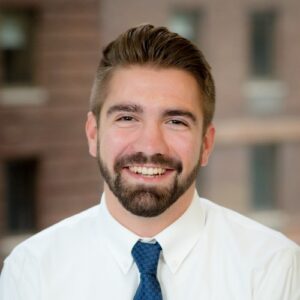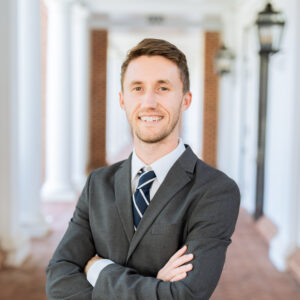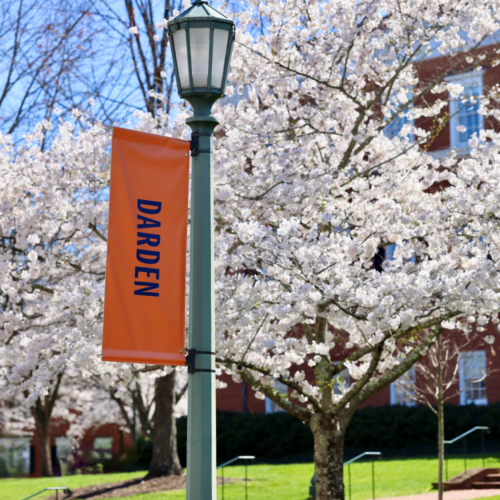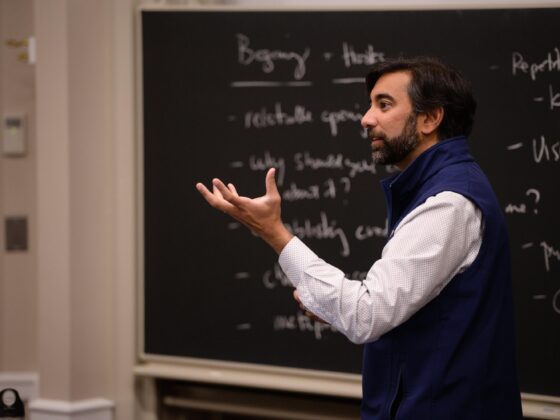The Future Year Scholars Program (FYSP) is Darden’s deferred enrollment program in which prospective students apply during their final year of an undergraduate program. Two to five years of work experience later, they come to Charlottesville to begin the Full-Time MBA (FTMBA) program!
Recently, Katherine Alford and Merav Frazier of Darden Admissions led current FTMBA students (previously Future Year Scholars) Matthew Cunningham, Zaira Khan, Nathan Pham and Dan Smith in a “Meet the Future Year Scholars” conversation. The discussion covered their personal Darden experiences, as well as valuable advice for prospective students. The group also shared candid insights into their recruiting journeys and the uncertainties they faced along the way.
When asked to describe the Darden community in one word, they chose the following: supportive, collaborative, inclusive and passionate.
Watch the webinar recording below and continue reading to learn more — we hope this conversation is inspiring for prospective Future Year Scholars or those in their deferral period with questions about when they should matriculate.
 Matthew Cunningham (Second Year)
Matthew Cunningham (Second Year)
Deferral period: 5 years
“I felt like I reached my learning plateau [at Accenture] and decided to end the deferral and come back to Darden.”
Undergraduate institution/major: UVA Engineering
Pre-Darden experience: Accenture’s engineering and manufacturing consulting group
“Speaking to fellow engineers: we do a lot of math, things like fluid dynamics, that might not seem overly relevant to the actual running of a business. I spent a lot of time working in R&D and operations, which is more executing on business strategy rather than setting business strategy…I realized that there were things that were happening at companies I was working at or consulting for that I had no idea were going on and that was really what drove me back from engineering to want to come and get that more holistic view of how a business runs.”
The Darden classroom: “I really love the classroom experience…It’s a fact that we work a lot more, classes are more demanding than other MBA programs, we’re not going to deny that but I also think that helped me a lot this summer [during my internship]. And the classes are just more engaging when people put more work into them, just like everything else is. The more effort people put in, the better the outcome is going to be. If you have 70 people doing that in a class, you lead to some very good discussions.”
 Zaira Khan (First Year)
Zaira Khan (First Year)
Deferral period: 2 years
Undergraduate institution/major: UVA Politics (Government)
Pre-Darden experience: M&T Bank Project Management
“Since I knew that I was trying to pivot out of politics and into an MBA program, I decided to work at a bank…and I was getting exposure to senior leadership, which I thought would be really important. I was really intentional about where I decided to work. Culture was a big deal for me, similarly to [why I chose] Darden.”
The Darden community: “[Darden] people really care. I think in the time that I deferred I reach out to every person at my bank that had gone to Darden and they took the time to meet with me, which is not the same for some of my friends that applied to different deferral programs. Now that I’m here, it’s something that you see all the time.”
“Darden offers a plethora of resources. After working for a couple of years, I thought I wanted to go into consulting but through CDWhy as well as having a personalized Second Year Coach — so you have a Second Year that’s gone through the process — and workshops where people review your resume, there’s so many opportunities for you to learn about what you want to do.”
 Nathan Pham (First Year)
Nathan Pham (First Year)
Deferral period: 5 years
Undergraduate institution/major: Temple University Management Information Systems and Finance
Pre-Darden experience: Technology and consulting at Deloitte and Reply
“I worked in technology consulting across two different firms and throughout this time I had a few different functional roles …a big part of the reason I was able to transition around between countries and firms was because I knew that I had the option to go back to school. That mindset allowed me to take more risks and do more things that I wouldn’t have been able to do otherwise. And during this entire time I got to tap into the network of Darden.”
The Darden classroom: “If you want to learn about finance, accounting or operations, you can take [a class] online…but the real value at Darden is you learn how to engage in a discussion. You learn how to listen and learn from the perspective of your friends. The tougher thing you cannot learn online is that you listen to people and you learn how to disagree with them, how to argue with them and you learn to think on your feet. You learn how to move the entire discussion forward. You can only do that effectively if you listen and you stay present…and you need a group of people to do that with.”
On standardized tests: “I took the GMAT three times over two years and it was a really long journey…One of the benefits [of choosing GMAT or GRE over ACT/SAT] is that it’s a lot easier for the admissions team to consider you for scholarship. It’s just more standardized. And the GMAT also tests very relevant skills that you will use in the MBA itself.”
He recommends signing up for a deadline three months ahead of time to give yourself a deadline for studying. The average student spends about 100 hours studying for their standardized test!
 Dan Smith (First Year)
Dan Smith (First Year)
Deferral period: 5 years
Undergraduate institution/major: McDaniel College German, Finance and Accounting
Pre-Darden experience: Finance at JPMorganChase and Barclays, soccer coach
“I did an internship [at JPMorganChase] my junior year and started in a corporate strategy role, and then about 18 months in pivoted to the credit card side…I felt that the internal strategy was good but I wanted to get some external relationships with clients. I launched two credit cards while at Chase.”
When he had the opportunity to start a position at Barclays, he reached out to Katherine Alford to find networking contacts to possibly pivot to the sports industry. “I felt like there were still growth opportunities for me…In the role at Barclays I was managing two analysts, so adding that to my repertoire for post-MBA was going to be the most impactful down the line.”
On the Darden community: “Everyone who comes here is very purposeful about why they are here.”






